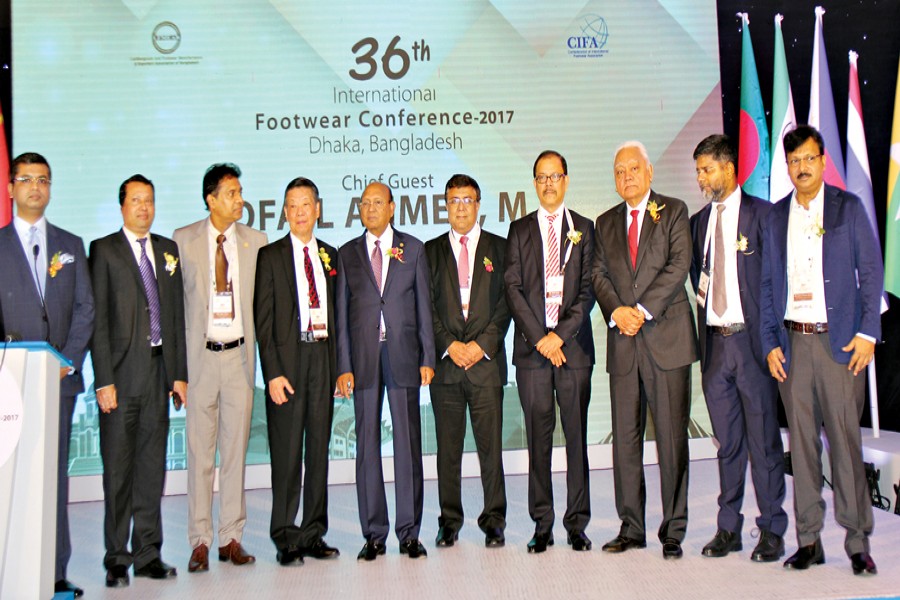Commerce Minister Tofail Ahmed, flanked by other dignitaries, poses for a photograph during the inauguration of the 36th International Footwear Conference (IFC) 2017 of the Confederation of International Footwear Associations (CIFA) in Dhaka on Wednesday. Leathergoods and Footwear Manufacturers and Exporters Association of Bangladesh (LFMEAB) has organised the programme. — FE Photo
Bangladesh will become a leading player in the global footwear market using its exclusive advantages, like - availability of raw materials, affordable labour, foreign investment-friendly policies, and priority on leather as an export sector here, experts opined on Wednesday.
They also said the footwear industry contributes around 1.54 per cent of the country's total export earning with an average yearly growth of around 29.8 per cent during the last five years.
These were disclosed at the inaugural session of the 36th International Footwear Conference (IFC) 2017 of Confederation of International Footwear Associations (CIFA), arranged for the first time in the country.
Leather goods and Footwear Manufacturers and Exporters Association of Bangladesh (LFMEAB) hosted this year's conference at a city hotel.
Commerce Minister Tofail Ahmed attended the programme as the chief guest.
Among others, commerce secretary Shubhashish Bose, CIFA secretary general Frank K Kung, Federation of Bangladesh Chambers of Commerce and Industry (FBCCI) first vice-president Sheikh Fazle Fahim, Apex Footwear Ltd chairman Syed Manzur Elahi, LFMEAB president and 36th IFC chairman Md Saiful Islam, and LFMEAB adviser Syed Nasim Manzur were also present.
Tofail Ahmed said the leather industry is the country's second largest export earning sector with an export volume of US$ 1.3 billion, next to the readymade garments (RMG) sector.
He said the government has considered the emerging sector as a priority one in the 7th Five-Year Plan. The Prime Minister has declared leather, leather goods, and footwear as the product of the year.
"If everything goes well, by the 50th anniversary of our country's independence in 2021, we will be able to earn $ 60 billion from export, of which $ 5.0 billion will come from the leather industry."
Addressing the foreign investors, he said if any foreign company relocates its factory to Bangladesh, they will enjoy duty- and quota-free market access.
It will also be able to repatriate 100 per cent of investment and profit anytime, he added.
Mr Ahmed also said the government has been developing 100 economic zones (EZs), and these will be distributed among the investors of specific countries apart from the local investors.
The investors of Japan, China and Singapore have already been awarded separate EZs, he added.
Syed Manzur Elahi, in his speech, thanked the participants for coming to Bangladesh, and urged the foreign investors to invest more in the country.
He said though there were some negative perceptions that Bangladesh might not be a congenial place for doing business due to flood, political instability and traffic congestions here, things have changed a lot.
Now, the country is the second largest RMG exporter in the world. At the same time, its food production has now reached over 40 million tonnes from 10 million tonnes during its independence.
These happened mainly because the people of Bangladesh are hardworking and resilient. "We (people of Bangladesh) get affected by flood, cyclone and other natural disasters, yet we survive and bounce back, and that is very important for a nation".
Talking about the future prospect of local footwear industry, he said, "We want to be a leading player in the global footwear market. Right now, we are not there yet, but we are not tired of trying."
Bangladesh became the member of CIFA in 2015, and got the opportunity to host the prestigious IFC 2017, participated by China, Cambodia, Hong Kong, India, Indonesia, Japan, South Korea, Malaysia, the Philippines, Thailand, Taiwan and Vietnam.
According to a report by Technavio USA, current size of the global leather market is $ 220 billion, which will become $ 271 billion by 2021.
Bangladesh has been ranked eighth in terms of footwear production in the world in 2016, producing 378 million pairs of shoes or 1.6 per cent of the total output, according to World Footwear Yearbook 2017.
Bangladeshi footwear industry is one of the fastest growing in the world, increasing export by nearly 700 per cent during the last decade, it noted.


